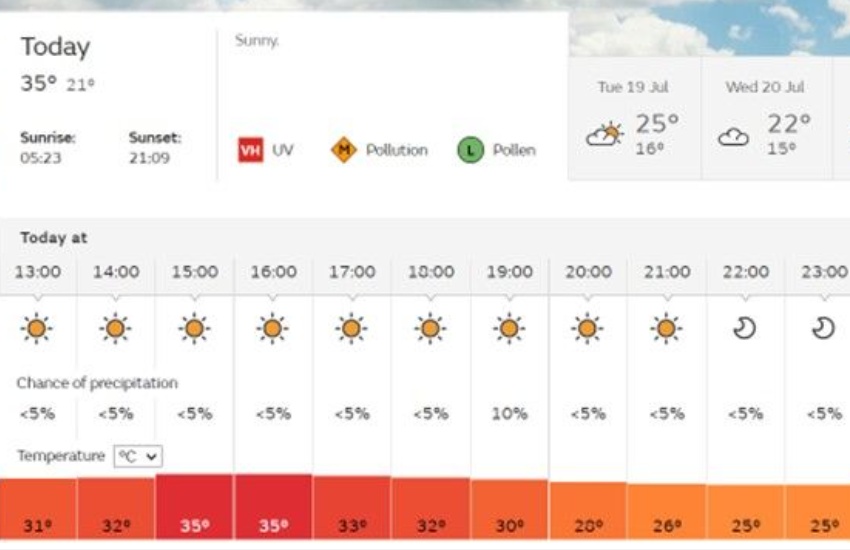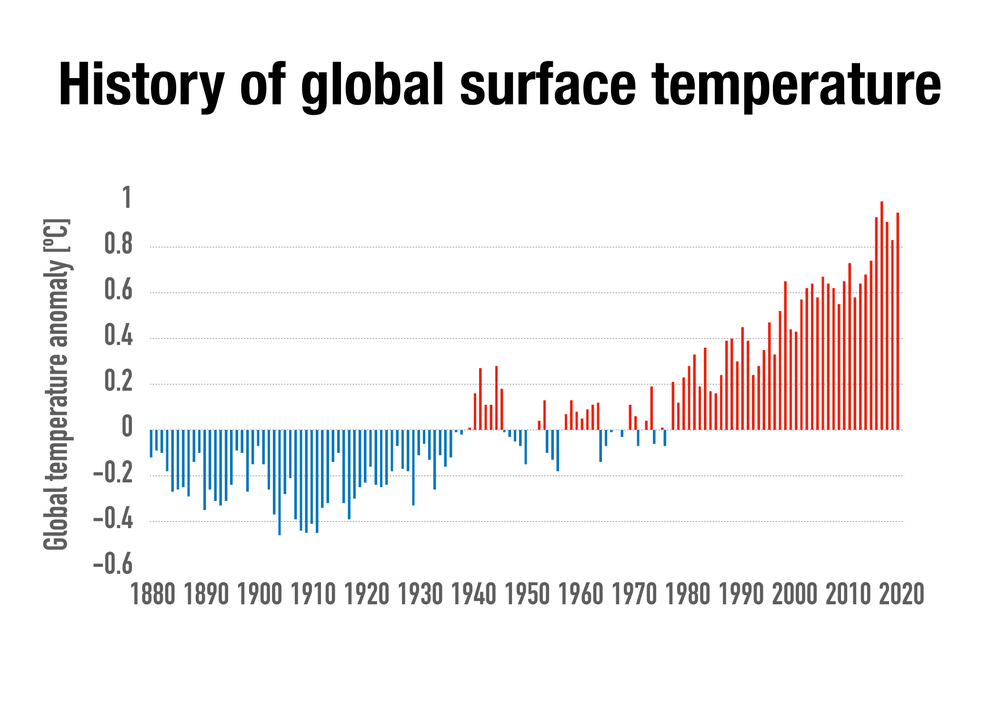


Extreme heat events, such as the high forecasted temperatures this week, can be attributed to climate change, according to Met Office scientists.
With record-breaking predicted highs of 35°C in Guernsey and over 40°C in the UK this week, a climate attribution scientist has said that the chances of repeat extreme highs could be 10 times more likely due to human impact.
President of the Committee for the Environment and Infrastructure, Deputy Lindsay De Sausmarez, commented that the Bailiwick is not exempt from the impacts of climate change.
“We are already seeing some of the effects of climate change in the Bailiwick in a number of different ways, such as a change in rainfall patterns, sea level rise and shifts in seasonal migration patterns in bird populations,” she said.

Pictured: The Guernsey Met Office forecasted a high of 35°C yesterday. The hottest day since records began in Guernsey was 34.3°C on 9 August 2003.
Deputy De Sausmarez continued: “The unusually high temperatures which were predicted for this week is another example and, worryingly, it is a phenomenon that is likely to become less unusual and more frequent in future.”
In a statement released last week (available HERE), Met Office Climate Attribution Scientist, Dr Nikos Christidis, also confirmed that “extreme heat events” would become more likely.
“In a recent study we found that the likelihood of extremely hot days in the UK has been increasing and will continue to do so during the course of the century, with the most extreme temperatures expected to be observed in the southeast of England,” he said.
“Climate change has already influenced the likelihood of temperature extremes in the UK. The chances of seeing 40°C days in the UK could be as much as 10 times more likely in the current climate than under a natural climate unaffected by human influence.
“The likelihood of exceeding 40°C anywhere in the UK in a given year has also been rapidly increasing, and, even with current pledges on emissions reductions, such extremes could be taking place every 15 years in the climate of 2100.”

Pictured: President of the Committee for the Environment and Infrastructure, Deputy Lindsay De Sausmarez, has researched environmental degradation and climate change and written commissioned pieces on the subject.
Deputy De Sausmarez said that the extreme heat warning this week “underscores the urgency of our work as an island to mitigate climate change”.
“The effects of climate change are unavoidable and it's already happening, but meaningful and rapid reductions in greenhouse gas emissions globally will help reduce the severity of those effects,” she said.
“Extremely high temperatures have a range of impacts. As well as the obvious and serious health risks, that kind of heat could affect our infrastructure, such as our roads, and put a lot of pressure on our electricity and water networks. There is also a heightened risk of wildfires.
“We have greatly reduced our emissions in Guernsey since 1990, but we still have some way to go to meet, or better, beat, our net zero targets. Adapting the island to the effects of climate change is also, sadly, going to become increasingly important.”
 Pictured: Met Office Climate Attribution Scientist, Dr Nikos Christidis, said extreme heat events can be attributed to climate change.
Pictured: Met Office Climate Attribution Scientist, Dr Nikos Christidis, said extreme heat events can be attributed to climate change.
A recent Met Office study found that summers which see days above 40°C somewhere in the UK have a return time of 100-300 years at present, even with current pledges on emissions reductions this can decrease to 15 years by 2100.
“The chances of seeing 40°C days in the UK could be as much as 10 times more likely in the current climate than under a natural climate unaffected by human influence,” according to the Met Office.
“Extreme heat events do occur within natural climate variation due to changes in global weather patterns. However, the increase in the frequency, duration, and intensity of these events over recent decades is clearly linked to the observed warming of the planet and can be attributed to human activity.
“Whilst a 1°C background temperature increase may not seem significant, the resulting increase in the severity of extreme heat events is already evident in the observed record. This has widespread and significant impacts.”
Deputy De Sausmarez agreed: ““Every fraction of a degree of warming makes a difference, and so therefore does every effort to reduce emissions, as individuals and as a community.”
Comments
Comments on this story express the views of the commentator only, not Bailiwick Publishing. We are unable to guarantee the accuracy of any of those comments.